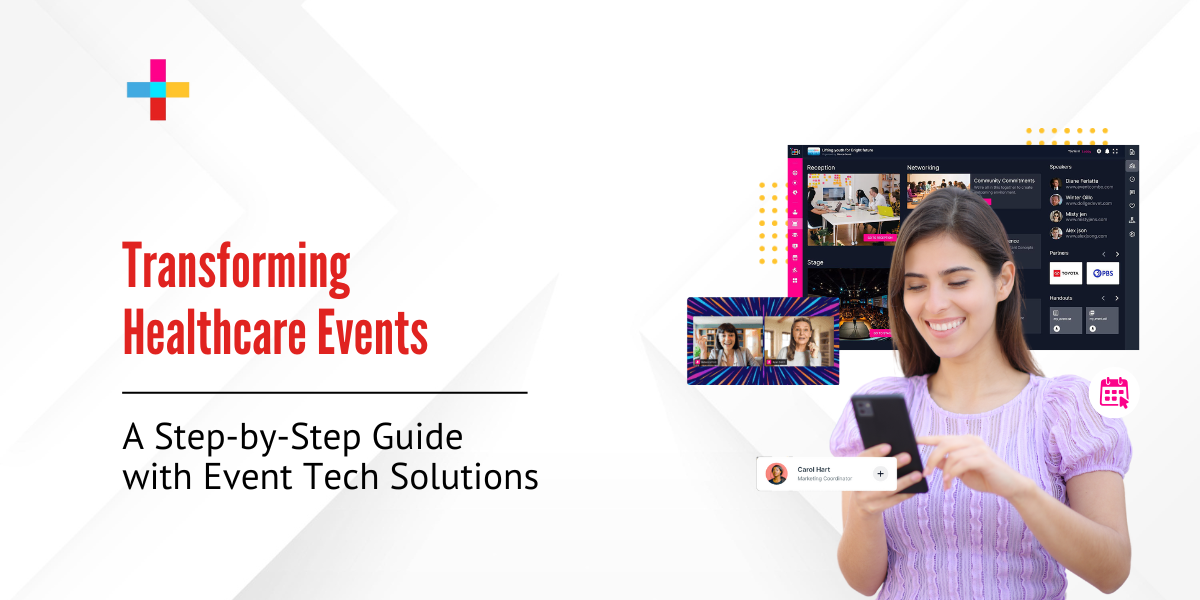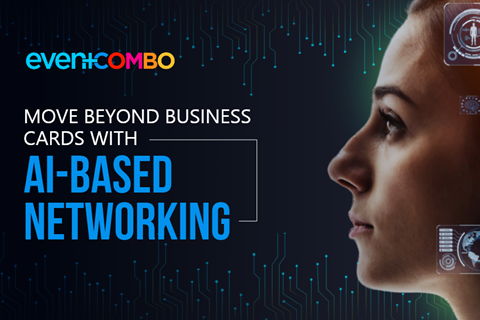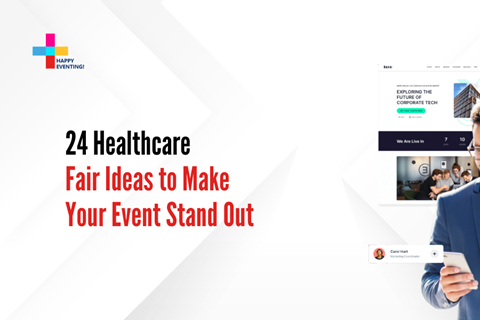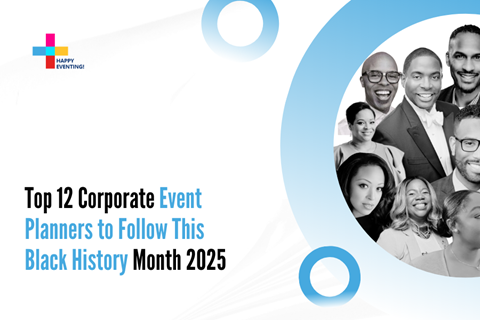

Healthcare events play a pivotal role in advancing medical knowledge, fostering collaboration, and driving innovation within the sector. From groundbreaking medical conferences to patient advocacy gatherings, these events serve as dynamic platforms to exchange ideas, unveil advancements, and create global connections.
As the demand for impactful healthcare events grows, the way these events are planned and executed is undergoing a significant transformation. Technology now stands at the forefront, enabling organizers to deliver seamless, engaging, and efficient experiences tailored to diverse audiences, including healthcare professionals, policymakers, and patients.
This blog offers a comprehensive guide to transforming healthcare events through strategic planning and event tech integration. We’ll look into the fundamentals of healthcare events, explore audience-specific strategies, and highlight how technology can help overcome challenges while unlocking new possibilities. By the end of this guide, you’ll have actionable insights to boost your healthcare events to new heights of success.
Let’s explore the world of healthcare events and discover how the right strategies and tools can make a lasting impact.
Healthcare events are vital for driving advancements and creating collaboration across the industry. This chapter explores what defines healthcare events, their evolution, key audiences, and the challenges organizers face in creating impactful experiences.
Healthcare events are specialized gatherings that bring together key players from the medical, pharmaceutical, and wellness industries. These events serve as dynamic platforms to share knowledge, showcase innovations, and collaborate on solutions for pressing healthcare challenges.
From advancing medical science to raising public health awareness, healthcare events play a vital role in shaping the future of global health.
Unlike traditional industry conferences, healthcare events focus on high-stakes topics that directly impact lives, improving patient outcomes, advancing research, and addressing global health issues. They also cater to a diverse audience, making them uniquely challenging yet incredibly impactful.

Healthcare events differ from other industry events due to their critical objectives, diverse audiences, and the sensitive nature of the topics discussed. Here’s why they demand a tailored approach:
Healthcare events must adhere to stringent legal and ethical guidelines. Whether it’s ensuring HIPAA compliance when handling patient data or adhering to pharmaceutical marketing regulations, organizers must be meticulous about meeting these standards to avoid legal repercussions.
Unlike many industries, healthcare events cater to a mix of professionals, patients, sponsors, and policymakers, all with different priorities. Tailoring the event’s format, content, and communication style to engage each group effectively is crucial.
Healthcare events often involve scientific discussions or technical demonstrations. Making this information accessible to a wide audience without oversimplifying for experts requires a fine balance and skilled communication.
While many industry events focus on networking or revenue, healthcare events are often driven by a higher mission: improving lives, advancing knowledge, or fostering collaboration. This focus on altruistic outcomes requires an empathetic and thoughtful event strategy.
The effects of healthcare events ripple far beyond their conclusion. These events often result in tangible improvements in healthcare delivery and public health. Whether it’s adopting a new medical protocol, raising awareness for a health condition, or strengthening collaborations between HCPs, their impact is far-reaching.

One of the defining characteristics of healthcare events is the diversity of their audience. Unlike other industries, healthcare events bring together a broad range of stakeholders, each with unique needs, goals, and expectations. Here’s an overview of the key audience segments for healthcare events:
Doctors, nurses, researchers, and specialists form the backbone of healthcare events. These professionals attend events to gain knowledge, enhance skills, and network with peers. For them, healthcare events serve as a platform to:
Event Tip: Offering CME credits, live demonstrations, and evidence-based discussions can make your event more appealing to this segment.
Representatives from pharmaceutical firms and medical device manufacturers, including sales reps, product managers, and marketers, attend healthcare events to:
Event Tip: Create dedicated exhibit areas or product launch sessions where these companies can interact directly with HCPs and other stakeholders.
This segment includes individuals directly affected by health conditions, as well as their families, caregivers, and advocacy groups. Their participation adds a human element to healthcare events, emphasizing patient-centered approaches. Patients and caregivers typically attend to the following:
Event Tip: Incorporate patient-led sessions, personal storytelling, and support group activities to engage this audience effectively.
Public health educators, policymakers, and nonprofit organizations play a crucial role in shaping healthcare initiatives at a community and global level. At healthcare events, they aim to:
Event Tip: Include breakout sessions or panels focusing on policy discussions, global health issues, and actionable solutions.
This audience segment includes venture capitalists, angel investors, and healthcare startups eager to disrupt the industry with innovative ideas. These participants attend healthcare events to:
Event Tip: Organize pitch competitions, innovation showcases, or networking sessions tailored to startups and investors.
Each of these segments brings unique perspectives and goals to healthcare events. By identifying and understanding their needs, event organizers can design experiences that provide targeted value, create meaningful interactions, and ensure the event’s success.

Healthcare events encompass a wide array of formats, each designed to meet specific goals and address the diverse needs of the healthcare industry. Here’s an in-depth look at the most common types of healthcare events:
These events are the cornerstone of knowledge sharing and networking in the healthcare industry. They bring together professionals, companies, and thought leaders to discuss emerging trends, showcase innovations, and collaborate on solutions to industry challenges.
Example: The HIMSS Global Health Conference & Exhibition, one of the largest trade shows focusing on healthcare information and technology.
CME programs are specialized events designed to help HCPs stay updated with the latest medical practices, technologies, and research. These events are critical for maintaining licensure and enhancing professional development.
Purpose:
Key Features:
Example: A surgical skills workshop designed for practicing surgeons to learn new minimally invasive techniques.
These events focus on introducing new drugs, medical devices, or therapies to the market. They are typically hosted by pharmaceutical or biotech companies and target HCPs, researchers, and investors.
Purpose:
Key Features:
Example: A global launch event for a new diabetes drug featuring live patient testimonials and hands-on device demonstrations.
These events are aimed at the general public, focusing on promoting healthier lifestyles and raising awareness about critical health issues. NGOs, government agencies, or healthcare providers often organize them.
Purpose:
Key Features:
Example: A nationwide flu vaccination drive or a public health expo addressing heart disease awareness.
As digital health continues to transform the healthcare industry, telemedicine and digital health summits focus on the technologies, platforms, and innovations driving this change.
Purpose:
Key Features:
Example: The Digital Health Summit at CES, where leaders discuss how technology is reshaping healthcare delivery.
Each type of healthcare event is designed to address specific objectives, audiences, and challenges within the healthcare ecosystem. By choosing the right format and tailoring it to your goals, you can create impactful events that drive meaningful change in healthcare delivery and innovation.
While these events have the potential to create meaningful impact, they also come with unique challenges that demand strategic solutions.

Organizing healthcare events requires meticulous planning and the ability to address unique challenges that stem from the industry’s regulatory, logistical, and audience-specific demands. Let’s explore some challenges that occur in healthcare event planning:
Healthcare events must adhere to strict legal and ethical standards. Key compliance challenges include:
Healthcare events attract a wide range of participants with different objectives. Key challenges include:
In-person events continue to be preferred in healthcare but present logistical and engagement challenges, such as:
Technology is critical to event success but can introduce challenges during execution. These include:
Justifying the impact of healthcare events on stakeholders is a significant challenge. Key areas include:
While healthcare event planning comes with its fair share of challenges, each obstacle is an opportunity to deliver a more thoughtful and impactful experience. Let’s now understand how to efficiently plan a healthcare event and the role event technology plays in overcoming these challenges.
Planning and promoting healthcare events require a strategic approach to ensure they meet diverse objectives and resonate with varied audiences. This chapter explores key steps for effective planning and innovative promotional strategies to maximize impact.
Planning a healthcare event requires a well-structured approach to ensure all components align seamlessly with your objectives and audience expectations. Whether you’re organizing a medical conference, a product launch, or a wellness fair, these seven essential steps will help you deliver a successful and impactful event:


Selecting the right format for your event ensures that it aligns with your objectives and caters to the preferences of your audience. Here are the primary options to consider:
Technology is the backbone of a successful healthcare event. Choosing the right event tech platform simplifies planning and execution. Let’s look at some key features that an event tech platform should have:
Pro Tip: Schedule a demo with your chosen platform to ensure it meets your specific needs.

An engaging agenda keeps attendees informed and excited about your event. It ensures attendees stay engaged, sessions run smoothly, and all key objectives are met. By organizing the schedule thoughtfully, you can create a seamless flow that balances education, interaction, and networking opportunities. Here’s what to include:
Pro Tip: Build flexibility into your agenda to accommodate last-minute changes or extended discussions.

Your event website serves as the digital hub where attendees can access essential information and register. It acts as a central platform for details, registration, and updates, ensuring a seamless experience for users. Here’s what to include:
Pro Tip: Use SEO strategies to improve your website’s visibility and attract organic traffic.

Effective promotion ensures that your target audience knows about your event and registers in time. A well-thought-out promotional strategy ensures that your event gains maximum visibility and generates excitement. By mixing a mix of channels, you can reach diverse audience segments and encourage participation. Use the following strategies:
Pro Tip: Invest in paid ads to target specific demographics, such as HCPs or caregivers, based on your event focus.

Analyzing attendee engagement during and after your event helps measure success and identify areas for improvement. Analytics offer valuable insights into attendee behavior, session participation, and overall performance, allowing you to refine future events. Focus on these key areas:
Pro Tip: Use analytics to personalize post-event communication, such as sharing session recordings or thanking attendees for their participation.
By following these steps, you can plan a healthcare event that meets your objectives and also delivers meaningful value to attendees. From defining your goals to using technology and analytics, a strategic approach ensures your event stands out in a competitive landscape.

Promotion is a critical element of any successful healthcare event. With a well-crafted strategy, you can effectively reach your target audience, build excitement, and maximize attendance. Here’s how to design a robust promotional plan that resonates with your audience and delivers results:
Healthcare events attract diverse attendees, from HCPs and patients to investors and policymakers. A one-size-fits-all approach won’t work. Your strategy needs to align with the unique needs and preferences of each audience segment. Below are specific approaches to connect with different segments:
Pro Tip: Segment your email lists and advertisements by audience type to ensure targeted and effective communication.
Email marketing and social media are two of the most powerful tools for promoting healthcare events. Each offers unique advantages in connecting with your audience and driving registrations. Here’s how to utilize them effectively:
Pro Tip: Utilize paid ads on social platforms to target specific demographics, such as HCPs, based on job titles and interests.
Collaborating with sponsors, industry leaders, and influencers can significantly amplify your event’s reach and credibility. Focus on these key partnership opportunities:
Pro Tip: Offer exclusive perks, such as early access to content or VIP event experiences, to incentivize sponsor and influencer engagement.
Healthcare professionals often prioritize events that provide clear benefits, such as financial savings or professional development opportunities. Here’s how to attract them:
Pro Tip: Combine these offers with group discounts or referral incentives to encourage team registrations and word-of-mouth promotion.
By utilizing tailored strategies, the right channels, and meaningful partnerships, your promotional efforts can effectively capture the attention of your target audience, drive registrations, and set the stage for a successful healthcare event.
Event technology is transforming the way healthcare events are planned and executed. By integrating advanced tools, organizers can enhance attendee engagement, streamline operations, and ensure compliance, making events more impactful and efficient.
Technology is no longer optional; it’s a necessity. Event tech solutions have transformed the way organizers plan, execute, and measure the success of their events, offering a range of benefits that enhance attendee experience, streamline operations, and ensure compliance. Here’s how event tech is revolutionizing healthcare events:
Audience engagement is the cornerstone of a successful event, and event tech provides innovative ways to keep participants actively involved. Here are some ways event tech improves audience engagement:
Event tech streamlines the registration process, making it efficient and user-friendly for both organizers and attendees. Here are ways event tech simplifies registration and attendee management:
Event tech provides robust analytics tools that give organizers a deeper understanding of attendee behavior and event performance. Here’s how data collection enhances event performance and ROI tracking:
Event tech has expanded accessibility, making healthcare events more inclusive and reaching broader audiences through virtual and hybrid options. Here’s how virtual and hybrid formats help make events more inclusive:
Compliance is a top priority for healthcare events, and event tech helps ensure adherence to industry regulations. Here’s how virtual and hybrid formats help make events more inclusive:
With event tech tools, you can be confident that your event will remain secure and compliant with all necessary regulations. For example, platforms like Eventcombo offer:
These features help you maintain security and trust throughout your event, protecting both organizer and attendee information.
With this comprehensive feature set, event tech becomes a transformative tool that enhances every aspect of healthcare event planning and execution.
Healthcare events come with unique demands, requiring robust, reliable, and compliant technology solutions. Selecting the right platform can make all the difference in delivering a healthcare event that resonates with attendees and achieves its objectives.

When choosing an event tech platform for healthcare events, prioritize features that align with the industry’s specific needs. Here are the must-have capabilities:
Personalization plays a key role in creating a professional and memorable event experience. Look for platforms that allow you to:
Data security and compliance are non-negotiable in healthcare events. The platform must:
A robust analytics system is vital for monitoring performance and measuring success. Choose a platform that offers:
Creating connections and engagement among attendees is essential for healthcare events. Look for features such as:
Eventcombo is a powerful event tech platform designed to meet the unique demands of healthcare events. With its range of tailored features and seamless user experience, it provides healthcare organizers with the tools they need to create memorable and impactful events. Here are the features provided by Eventcombo:
Apart from the features mentioned, Eventcombo also excels in areas like speaker management, sponsor management, and venue management, ensuring that every aspect of the event is handled efficiently.
Additionally, Eventcombo offers powerful integrations with third-party tools, enabling smooth workflows and enhancing the overall event experience. Its open API further allows for customization and flexibility, giving organizers the ability to tailor the platform to their specific needs. This end-to-end solution ensures that healthcare event planners can focus on delivering impactful experiences while Eventcombo handles the technical and logistical complexities.
Healthcare events hold the potential to transform the industry by creating innovation, collaboration, and shared learning. They bring together professionals, advocates, and visionaries to address pressing challenges, unveil advancements, and create lasting solutions.
Organizers must adapt to the growing landscape by utilizing tools and strategies that prioritize engagement, accessibility, and compliance. Event technology offers the means to achieve this, enabling seamless operations while creating personalized, impactful experiences for diverse audiences.
As the healthcare sector continues to grow, so too must the approach to organizing its events. By using technology, focusing on audience-centric strategies, and delivering data-driven insights, healthcare events can go beyond being gatherings to becoming platforms for progress.
Eventcombo offers an end-to-end solution, supporting every stage of your healthcare event, from planning to execution. This all-in-one platform ensures a seamless experience for both organizers and attendees, helping you achieve your event's goals with ease.
Ready to transform your healthcare events? Book a demo with Eventcombo today and discover how you can simplify planning, engage audiences, and achieve your goals with confidence.

Networking is one of the most valuable ways to discover boundless opportunities and for 77.7% of business professionals , in-person conferences open a greater scope to make rewarding connections.

When planning a healthcare fair, the goal goes beyond booking a venue and sending out invites. You’re creating an event that brings together healthcare professionals, researchers, and exhibitors, all seeking value and...

Diversity and inclusion are at the heart of the events industry, where planners are focused on creating experiences that bring together people from all walks of life.